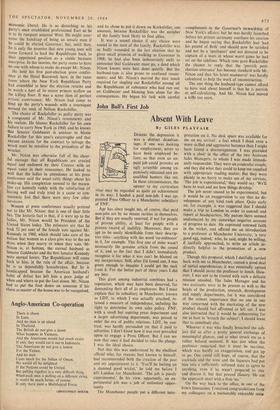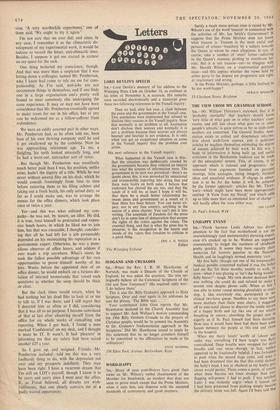John Bull's First Job
Absent With Leave
By GILES
PLAYFAIR Age has since taught me, of course, that paid non-jobs are by no means rarities in themselves. But if they are usually reserved, if not for people of proven ability, at least for people with a proven record of inability. Moreover, they are apt to be easily identifiable from their descrip- tive titles--anything with the word 'co-ordinator' in it, for example. This first one of mine wasn't necessarily the genuine article from the sound of it, and so the fact that I didn't immediately recognise it for what it was can't be blamed on my inexperience. Still, after I'd found out, I was green enough to imagine I could get the Sack from it. For the better part of three years I did my best.
This giant among industrial combines had a reputation, which may have been deserved, for demanding their all of its employees. But I must explain that its subsidiary in Manchester, known as LDT, to which I was actually attached, re- tained a measure of independence, including the right to determine its own sales policy. FNF, with a small but aspiring press department and a larger advertising department, was poised to enter the era of public relations. LDT, by con- trast, was hardly persuaded yet that it paid to advertise. I don't know how it was ever prevailed upon to engage a Press Officer. But I can see now that once it had decided to take the plunge, I was the ideal choice.
Not that this was understood by the ebullient official who, for reasons best known to himself, had recommended both the creation of the post and my appointment to it. 'You'll be batting on a damned good wicket,' he told me before I left London for Manchester. 'The job is purely experimental.' In his view, apparently, an ex- perimental job was a job of unlimited oppor- tunity.
The Manchester people put a different inter-
pretation on it. No desk space was available for me on my arrival: a fact which I think even a more skilled and aggressive batsman than I might have found a discouragement. I was provided with a chair in the office of the two Assistant Sales Managers, to whom I was made immedi- ately responsible. They were an avuncular couple, and they did what they could to keep me supplied with appropriate reading matter. But they were plainly in no hurry to make use of my services. 'The job is experimental,' they would say. 'We'll have to wait and see how things develop.'
The job never ceased to be experimental, but it would be an exaggeration to say that no de- velopment of any kind took place. Quite early on, for example, it was suggested that I should make a trip to London in order to consult and report at headquarters. My patron there seemed undismayed by my somewhat negative account of progress to date. He expressed renewed faith in the wicket, and offered me an introduction to a professor at Manchester University, 'a very good egg, indeed,' who, he said, might be willing, if tactfully approached, to write an article in- directly helpful to the promotion of a new product.
Though this proposal, which I dutifully carried back with me to Manchester, caused a good deal of initial apprehension, it was eventually agreed that I should invite the professor to lunch. How- ever, I was not to be trusted with such a delicate mission unaided. The Sales Manager and his two assistants were to be present as well as the heads of the production, research, development and supply departments, for it was considered of the utmost importance that no one in any way concerned with the marketing of the new product should feel affronted or left out. I was also instructed that it would be unbecoming for me as host to 'broach the subject'; I should leave that to somebody else.
Whoever it was who finally broached the sub- ject did so after a pretty general exchange of meaningful glances, and at what struck me as a rather belated moment. It was just when the professor remarked that it must be tea-time, which was hardly an exaggeration, and got up to go. One could still hope, of course, that the cocktails and the wine and the liqueurs had-put him into a sufficiently softened state to agree to anything, even if he wasn't prepared to stay and discuss it, but that proved illusory. He cut the approach short with a firm 'no.'
On the way back to the office, in one of the firm's limousines, I received congratulations front my colleagues on a memorably enjoyable aces
sion. 'A very worthwhile experiment,' one of them said. 'We ought to try it again.'
I'm not sure that we ever did; and since, in any case, I remember it as the climacteric de- velopment of my experimental work, it would be tedious to record the lesser, anti-climactic ones. Besides, I suppose it got me started in earnest on my quest for the sack.
One thing bothered my conscience, though. And that was more than a suspicion that I was letting down a colleague, named Mr. Pemberton, who I knew had come to rely on me for com- panionship. As I've said, non-jobs are not uncommon things in themselves, and if one finds one in a large organisation one's pretty well bound to meet somebody else undergoing the same experience. It may or may not have been coincidence that Mr. Pemberton eventually agreed to make room for me in his office, but at any rate he welcomed me as a fellow-sufferer from redundancy.
We were an oddly assorted pair in other ways. Mr. Pemberton had, as he often told me, been boss of his own thriving company until he and it got swallowed up by the combine. Now he was approaching retirement age. To me, a fledgling, his teeth looked unusually long, and he had a worn-out, nutcracker sort of voice.
But though Mr. Pemberton was manifestly much better paid than I was, his position, unlike mine, hadn't the dignity of a title. While he was never without several files on his desk, which he would consult frowningly from time to time before restoring them to his filing cabinet and taking out a fresh batch, his only actual duty, so far as I could make out, was to arrange the menus for the office dinners, which took place once or twice a year.
Yet—and this was what enlisted my sym- pathy—he was not, by nature, an idler. He did, it is true, treat himself to protracted and expen- sive lunch hours, in which he liked me to join him, but. that was excusable, I thought, consider- ing that all he had left for a job presumably depended on his maintaining his reputation as a gastronomic expert. Otherwise, he was a punc- tilious observer of office hours, and seldom if ever made a trip anywhere. What's more, he took the fullest possible advantage of his rare opportunities to prove himself 'worthy of his hire. Weeks before the appointed date of an office dinner, he would embark on a furious dic- tation of internal memoranda that raised such questions as whether the soup should be thick or clear.
But the slack times would return, when he had nothing but his dead files to look at or me to talk to, if I was there; and I still regret that I deserted him as often as I did, considering that it was all to no purpose. I became convinced of that at last after absenting myself from the offi'ce for six whole weeks of consulting and reporting. When I got back, I found a note marked 'Confidential' on my desk, and I thought it must be IT. It wasn't. It had 'pleasure' in informing me that my salary had been raised another £25 a year.
So I gave up, and resigned. Friends--Mr. Pemberton included—told me this was a very foolhardy thing to do, with the depression not over and my prospects indefinite. They may have been right. I have a recurrent dream that I'm still on LDT's payroll, though I know it to be years and years since I went near the office. If, as Freud believed, all dreams are wish- fulfilments, that one clearly convicts me of a badly wasted opportunity.



































 Previous page
Previous page